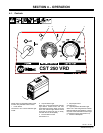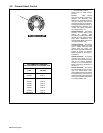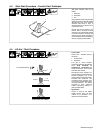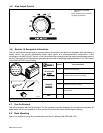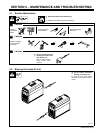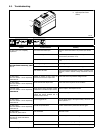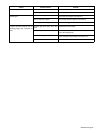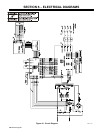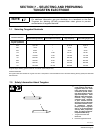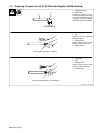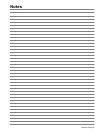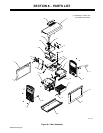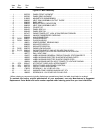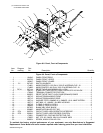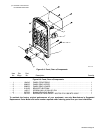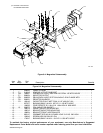
OM-220 812 Page 27
SECTION 7 − SELECTING AND PREPARING
TUNGSTEN ELECTRODE
gtaw 7/97
For additional information, see your distributor for a handbook on the Gas
Tungsten Arc Welding (GTAW) process.Wear clean gloves to prevent
contamination of tungsten electrode.
NOTE
7-1. Selecting Tungsten Electrode
Amperage Range - Gas Type♦ - Polarity
Electrode Diameter DC − Argon − Electrode
Negative/Straight Polarity
DC − Argon − Electrode
Positive/Reverse Polarity
AC − Argon − Using
High Frequency
AC − Argon − Balanced
Wave Using High Freq.
2% Thorium Alloyed
Tungsten (Red Band)
.010” Up to 25 * Up to 20 Up to 15
.020” 15-40 * 15-35 5-20
.040” 25-85 * 20-80 20-60
1/16” 50-160 10-20 50-150 60-120
3/32” 135-235 15-30 130-250 100-180
1/8” 250-400 25-40 225-360 160-250
5/32” 400-500 40-55 300-450 200-320
3/16” 500-750 55-80 400-500 290-390
1/4” 750-1000 80-125 600-800 340-525
♦Typical argon shielding gas flow rates are 15 to 35 cfh (cubic feet per hour).
*Not Recommended.
The figures listed are intended as a guide and are a composite of recommendations from American Welding Society (AWS) and electrode
manufacturers.
7-2. Safety Information About Tungsten
Ref. S-0161
Y Grinding the tungsten elec-
trode produces dust and fly-
ing sparks which can cause
injury and start fires. Use lo-
cal exhaust (forced ventila-
tion) at the grinder or wear an
approved respirator. Read
MSDS for safety information.
Consider using tungsten
containing ceria, lanthana,
or yttria instead of thoria.
Grinding dust from thoriated
electrodes contains low-lev-
el radioactive material.
Properly dispose of grinder
dust in an environmentally
safe way. Wear proper face,
hand, and body protection.
Keep flammables away.
1 Tungsten Electrode With
Balled End
2 Pointed Tungsten Electrode
1
2



